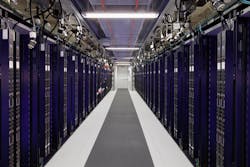The Future of Data Centers: Embracing Innovation for Industry Growth
The Challenge of Limited Market Capacity
The data center industry has witnessed accelerating growth in recent years, driven by the rise of cloud computing, internet computing, internet of things (IoT) and let’s not forget the pandemic. As more organizations migrate their workloads to the cloud and their staff to remote work, the demand for data centers has skyrocketed.
One of the most significant challenges faced by data center operators is limited regional and national market capacity. Prime locations for data centers have largely been developed, if not over developed, leaving operators with few expansion options.
In response to this challenge, operators are adopting innovative solutions like modular and prefabricated data centers, which can be quickly and efficiently deployed in new secondary markets and rapidly scaled. These modular and prefabricated data centers are designed for high efficiency and can be scaled up or down as required. There is a foreseeable future where modular and prefabricated data centers will be as common as utility substations.
Power and Cooling Constraints
Power and cooling constraints pose another major challenge for data center operators. As data center equipment becomes more powerful, it also grows more densely packed, necessitating more power and cooling infrastructure per unit volume.
Providing adequate power and cooling infrastructure can be costly and space-consuming. Data centers must maintain a delicate balance between supplying sufficient power and cooling to support their equipment while minimizing costs and maximizing space. Additionally, a majority of the traditional cooling systems place an enormous burden on local water utilities, with consumption in some cases being in the millions of gallons per month.
To tackle this challenge, operators are implementing innovative solutions like liquid and immersion cooling, which offers more efficient cooling while reducing overall power consumption. Additionally, operators are exploring renewable energy sources, such as wind and solar, to decrease their reliance on traditional power sources. Furthermore, waterless cooling systems will be the de-facto standard moving forward and will also lead major retrofit projects for large water consumers.
The Importance of Purpose-Built Infrastructure for Efficiency and Density
As data center operators grapple with the challenges of limited market capacity and power constraints, it becomes evident that purpose-built infrastructure is crucial for achieving maximum efficiency and density.
Industry leaders are addressing these challenges by constructing purpose-built infrastructure specifically designed for high-performance computing, artificial intelligence, and mission-critical applications. This includes highly efficient colocation services featuring ultrahigh-density power and network data suites and a new design paradigm for critical cooling and power. Waterless, direct to compute cooling will dominate with grid scale energy storage and rack unit equivalent densities exceeding 150KW.
By concentrating on purpose-built application specific infrastructure, data center operators can enhance efficiency while ensuring maximum uptime and performance for their clients.
Embracing Innovation for Industry Growth
The demand for data centers continues to rise, and operators face significant challenges balancing regional and national market space and power constraints. By adopting innovative solutions like modular data centers, liquid and immersion cooling, renewable energy sources and a willingness to ignore legacy designs and constraints, data center operators can tackle these challenges and continue to fulfill the growing demand for digital infrastructure.
By collaborating to address these challenges, industry leaders can ensure that the data center sector thrives and meets the needs of businesses worldwide, fostering continued growth and innovation in this vital industry.
Ryan King is Director of Business Development for DCX.us. DCX.us is transforming colocation with its state-of-the-art data center in Goodyear, Arizona. DCX founders George Slessman and Bill Slessman have dedicated a quarter-century to revolutionizing data center services and infrastructure. Together with their team, they designed DCX’s colocation service for technologists that use high performance computing and artificial intelligence/machine learning to discover, transform and solve. DCX delivers modular data center suites, allowing customers to build independent infrastructure that avoids the risks inherent in large scale colocation facilities where everything – power, network, clouds – is interdependent. DCX engineers are experts in deploying and operating HPC infrastructure with easy-to-use management tools and 24xforever data center support. To find out more about the benefits of collocating in Goodyear, contact Ryan King to schedule a tour.



